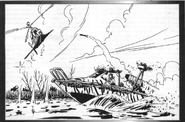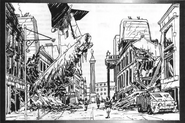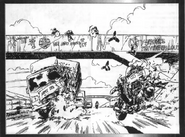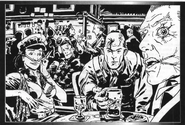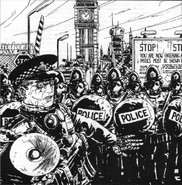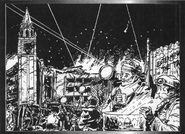Rough Guide to the UK
The United Kingdom is a country within the Cyberpunk universe.[1] The country suffered several devastating events in the beginning of the 21st century including uprisings, civil warfare and an anti-monarchist coup, the combination of which left it in considerable misery and disarray.[2]
History[]
1990s - 2020[]
The United Kingdom had made significant contributions to the world economy, especially in technology and industry. Since World War II, the United Kingdom's most prominent exports had been cultural, including literature, theatre, film, television, and popular music that drew on all parts of the country. Perhaps Britain's greatest export had been the English language, now spoken in every corner of the world as one of the leading international mediums of cultural and economic exchange.
In 1999, the British Monarchy was overthrown by the Martial Law Authority (MLA), an anti-monarchist military dictatorship that assumed power through the enactment of a perpetual state of emergency. When King Charles III led the Royal Marines in revolt against the MLA at Devonport in the early 2000s, he was killed along with his brother Prince Andrew. D.I.5 (also known as the Security Service) then implemented Operation Cromwell, the systematic elimination of all members of the royal family and heirs to the throne to permanently prevent the restoration of the monarchy. However, Operation Cromwell failed to eliminate two heirs which are both Princess Beatrice and Princess Eugenie, the daughters of Prince Andrew from his first marriage who had been living in Texas with their mother since the divorce in 1994.
In the time since the MLA's establishment, the country has been divided up into 16 zones. After numerous riots and protests, the opinion of the ruling party was low and Scotland erupted into open rebellion in 2016, with a Scottish nationalist movement being in a state of undeclared war with the government from 2013 to 2018. After years of martial law, Princess Beatrice returned to Britain in 2017 with the backing of the Cartel, a covert pro-monarchist organization created by the Hilliard Corporation and Imperial Metropolitan Agriculture. Assuming the name Victoria II, she led protects against the MLA, which was already crumbling due to the Cartel's provocation of civil unrest and the IMA's invasion of Bristol. Supporters quickly emerged in favor of the Restoration Movement, which was promising a return to the "good old days" before the chaos currently embroiling Britain, and was even backed by the corporations, who demanded laissez-faire style of government for them in return.
In a matter of months, the Council, the ruling body of the MLA, splintered as its members each went their own way. The last two members of the Council, Lord Hill and Lord McKenzie, threw in their lot with the monarchists to avert civil war and rescinded the state of emergency. A week later, Victoria II was crowned queen in Westminster Abbey, and a new democratic government was declared. Lord Hill was appointed prime minister, while Lord McKenzie became Chief of Staff to the military services and later Chairman and Managing Director of British Combined Forces, PLC, the UK's privatized armed forces, and a new central Parliament was established. Ironically, in order to ease the transition to democracy, the corporations and military introduced a fresh state of emergency and reorganized the country into districts based on the old kingdoms of Wessex, Mercia, Sussex, and Cornwall. By 2020, Britain had stabilized under its new and popular queen, but the gap between rich and poor remained as wide as ever.[2]
In 2016, the European Economic Community council approved on the construction of a tunnel between Europe and Northern Africa. The chosen route was the Strait of Gibraltar, giving the ECC full control over the area. The tunnel construction begun in 2017 and was finished in 2020. The former British colony of Gibraltar was turned into a gigantic waypoint for people and goods. The British troops already there, instead of going back to the UK, were transferred into the European Defence Commission to keep the installations under protection.[3]
2040s[]
By 2045, the United Kingdom was the only country in Europe to continue suffering from major economic trouble caused by the Fourth Corporate War. While other parts of Europe were steadily recovering, the UK was under strain from massive immigration and an antiquated technological base, rendering its streets as volatile as those in the New United States.[4]
2070s[]
By 2077, the government launched a referendum on rejoining the European Economic Community, although a note that British citizens should not rely on a referendum for the issue was given.[5]
Four members of the royal family suffered severe chemicals burns after they got caught in a hyper-acidic rain during one of their fox hunts.[6]
Geography[]
The United Kingdom (often abbreviated to UK) is an island country located off the north-western coast of mainland Europe. The United Kingdom is comprised of four constituent countries: England, Wales, Scotland, and Northern Ireland, which despite the UK being a unitary state, each possesses a certain degree of autonomy. The name Britain is also sometimes used to refer to the United Kingdom as a whole. The capital is London, which is among the world's leading commercial, financial, and cultural centres. Other major cities include Birmingham, Liverpool, and Manchester in England, Belfast and Londonderry in Northern Ireland, Edinburgh and Glasgow in Scotland, and Swansea and Cardiff in Wales.[2]
England[]

United Kingdom Map of 2020
England is a country that is part of the United Kingdom. It shares land borders with Wales to the west and Scotland to the north. The Irish Sea lies west of England and the Celtic Sea to the southwest. England is separated from continental Europe by the North Sea to the east and the English Channel to the south.
- Devon and Cornwall
- Wessex
- Sussex
- Mercia
- East Anglia
- Middle Anglia
- Northumbria
- Lindsey and Deria
- Lindisfarne
- Isle of Man and the Channel Islands
Scotland[]
Scotland is a country that is part of the United Kingdom. It covers the northern third of the island of Great Britain, with a border with England to the southeast, and is surrounded by the Atlantic.
- The Lowlands
- The Highlands
- The Islands
Wales[]
Wales is a country in southwest Great Britain known for its rugged coastline, mountainous national parks, distinctive Welsh language and Celtic culture. Cardiff, the capital, is a refined coastal city with a nightlife scene and a medieval castle with ornate Gothic Revival interiors. In the northwest, Snowdonia National Park has lakes, glacial landforms, hiking trails and a railway up to the peak of Snowdon.
- North Wales
- South Wales
Northern Ireland[]
Northern Ireland is variously described as a country, province or region which is part of the United Kingdom. Located in the northeast of the island of Ireland, Northern Ireland shares a border to the south and west with the Republic of Ireland.
Politics[]
A majority of the United Kingdom's population have become wandering travelers and nomads, leading indirectly to the country's impending collapse. Most cities now stand in ruins, with rebellions and terrorists fueling widespread conflict. In order to combat this conflict and protect the country from complete collapse, the government instituted a new form of law enforcement, providing a less scrupulous remedy for removing the gangs now plaguing the streets.
The people of the United Kingdom fall under a number of different categories; Nomads, Tribesmen, Law enforcement, Criminals, Royal, and Gang-members. At least 47% of the population of the UK is made up of tradesmen or nomads and because of this, the urban and industrial areas have fallen apart due to the lack of people to fulfil the workload. Many cities have become abandoned and even cities with a fairly large population have walled off sections of the city that now lie in ruins.[2]
Monarchy[]
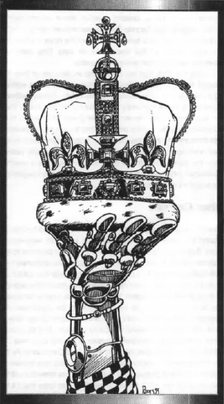
UK Monarchy
The monarchy of the United Kingdom, commonly referred to as the British monarchy, is the constitutional monarchy of the United Kingdom, its dependencies (the Bailiwick of Guernsey, the Bailiwick of Jersey and the Isle of Man) and its overseas territories. The monarch and head of state as of 2020 is Queen Victoria II, born Princess Beatrice, daughter of Sarah Ferguson, Duchess of York, and Prince Andrew, Duke of York. Victoria II ascended to the throne in 2017, marking the restoration of the monarchy and the end of the Martial Law Authority.
The monarch and their immediate family undertake various official, ceremonial, diplomatic and representational duties. As the monarchy is constitutional, the monarch is limited to non-partisan functions such as bestowing honours and appointing the prime minister. The monarch is commander-in-chief of the British Armed Forces. Though the ultimate executive authority over the government is still formally by and through the monarch's royal prerogative, these powers may only be used according to laws enacted in Parliament and, in practice, within the constraints of convention and precedent.
The British monarchy traces its origins from the petty kingdoms of early medieval Scotland and Anglo-Saxon England, which consolidated into the kingdoms of England and Scotland by the 10th century. England was conquered by the Normans in 1066, after which Wales too gradually came under control of ruling dynasty, which were the Plantagenets. The process was completed in the 13th century when the Principality of Wales became a client state to the Plantagenet king, Edward I. Meanwhile, the Magna Carta began a process of reducing the English monarch's political powers. From 1603, the English and Scottish kingdoms were ruled by a single sovereign. From 1649 to 1660, the tradition of monarchy was broken by the republican Commonwealth of England, which followed the Wars of the Three Kingdoms. In 1707, the kingdoms of England and Scotland were merged to create the Kingdom of Great Britain, and in 1801, the Kingdom of Ireland joined to create the United Kingdom of Great Britain and Ireland. The British monarch was the nominal head of the vast British Empire, which covered a quarter of the world's surface at its greatest extent in 1921.
In the early 1920's the Balfour Declaration recognized the evolution of the Dominions of the Empire into separate, self-governing countries within a Commonwealth of Nations. After the Second World War, the vast majority of British colonies, territories and dependencies were granted independence, effectively bringing the Empire to an end. George VI and his successor, Elizabeth II, adopted the title Head of the Commonwealth as a symbol of the free association of its independent member states. The United Kingdom and fifteen other independent sovereign states that share the same person as their monarch are called Commonwealth realms. Although the monarch is shared, each country is sovereign and independent of the others, and the monarch has a different, specific, and official national title and style for each realm.[2]
Government[]
The old government of the UK was led by the Prime Minister, who selects all the other ministers. The prime minister and their most senior ministers belong to the supreme decision-making committee, known as the Cabinet. All the government ministers sit in the Parliament, and are accountable to it. The government is dependent on Parliament to make primary legislation. After an election, the monarch selects as prime minister the leader of the party most likely to command the confidence of the House of Commons, usually by possessing a majority of MPs. The years after the collapse mark the fall of the governmental power within the nation.
With the restoration of the monarchy in 2017, Lord Hill was appointed the first prime minister of the new democracy. The corporations who had backed the restoration were allowed to send representatives to sit with select members of the public on constitutional subcommittees of the Democratic Government Committee (DGC) to reevaluate the structure of British government. The DGC eventually narrowed proposals down to two plans, both of which called for the formation of an elected central Parliament with members elected from local governments across the country. In the first plan, Members of Parliament had to raise £50,000 for a deposit and receive backing from five responsible public figures (doctors, attorneys, corp executives, and military officers) before they could run for office. Controversially, the winner of an election under this plan would be determined by the "first past the post method", not proportional representation. The second plan outlined a directly-elected Parliament with proportional representation. As of 2020, the DGC had yet make a final recommendation, a situation which political activists suggested was intentional to allow the military and corporations an indefinite period of leeway.
To this day, the British Government does not hold full control of the UK, with a majority of the land being devoid of urban development and instead dominated by chaos. Much of the nation has reverted to a form of feudalist communism, small communities helping one another - with citizens paying scant attention to the government. Various gangs across the UK regularly clash in their attempts to fill the power vacuum, which includes groups that range from local criminal organizations loosely allied with the Mafia to the Yakuza, Triads and other foreign cartels, even corporations. The British government lacks the resources to effectively exert more influence than these groups in the areas they inhabit, thus these areas inevitably remain out of governmental control.[2]
Culture[]
With the collapse of the government, the general populace of the United Kingdom tended to drift toward the various "nomad" groups roaming the countryside. Many believe the rise of the nomad culture was due to a belief that the various industries in Britain were slowing killing the island.
These tribes demonstrate more restraint and are evidenced to be more peaceful in their influence than the violent gangs plaguing the sprawling urban ruins and cities. Most tribes avoid these areas, choosing instead to settle amongst what's left of Britain's historic rolling hills, thick forests and idyllic lakes.
The country's war torn society is in a constant state of turmoil, with gangs and military outfits endlessly trading blows, battling over key control objectives.
Major Cities[]
London - 10 million[]
Once the great cultural centre of England, it is now a fractured, battle-scarred city divided into distinct sections. London remains the capital of England and still maintains a large population despite the exodus of many of its citizens. That which remains of its once grand urban sprawl is now maintained through strict law enforcement and military intervention.[2]
By 2077, rising sea levels caused a major flood in Europe that submerged large areas of London, the Netherlands, and Belgium. Refugees from London migrated into the British countryside, causing clashes with nomads as they started seizing supplies from nomad camps.[7]
Manchester - 700,000[]
Manchester is a major city in the northwest of England that historically has a rich industrial heritage. The Castlefield conservation area's 18th-century canal system harkens back to the city's days as a textile powerhouse. Visitors can trace this history at the interactive Museum of Science & Industry. In the year 2022, the city was mostly abandoned and walled off, leaving only a fraction of the city to be inhabited. Despite that, it is still a largely populated city with much to see, though visitors are advised against sightseeing beyond the city's walls.[2]
Edinburgh - 500,000[]
Edinburgh is Scotland's compact, hilly capital. It has a medieval Old Town and elegant Georgian New Town with gardens and neoclassical buildings. Looming over the city is Edinburgh Castle, home to Scotland's crown jewels and the Stone of Scone, used in the coronation of Scottish rulers. Arthur's Seat is an imposing peak in Holyrood Park with sweeping views, and Calton Hill is topped with monuments and memorials. After the Scottish uprising, the city became host to various unwelcome inhabitants, though remains largely unscathed and still functions much as it ever has to this day.[2]
Trivia[]
- While Rough Guide to the UK describes King Charles III as having been killed by the MLA in 1999, in real life he only became King of England in late 2022.
Gallery[]
References[]
- ↑ RAMOS, J. Eurosource Plus. 1st ed., Berkeley, CA, R. Talsorian Games, 1995.
- ↑ 2.0 2.1 2.2 2.3 2.4 2.5 2.6 2.7 2.8 GILLOTT, N. Rough Guide to the UK. 1st ed., Berkeley, CA, R. Talsorian Games, 1994.
- ↑ RAMOS, J. Eurosource Plus. 1st ed., Berkeley, CA, R. Talsorian Games, 1995.
- ↑ PONDSMITH, M. Cyberpunk RED Corebook. 1st ed., Kenmore, WA, R. Talsorian Games, 2020.
- ↑ Cyberpunk 2077 News Broadcasts#News Ticker
- ↑ Info Flash
- ↑ CD Projekt RED. Cyberpunk 2077. Video Game, Multi-Platform. Poland, CD Projekt S.A., 2020.


